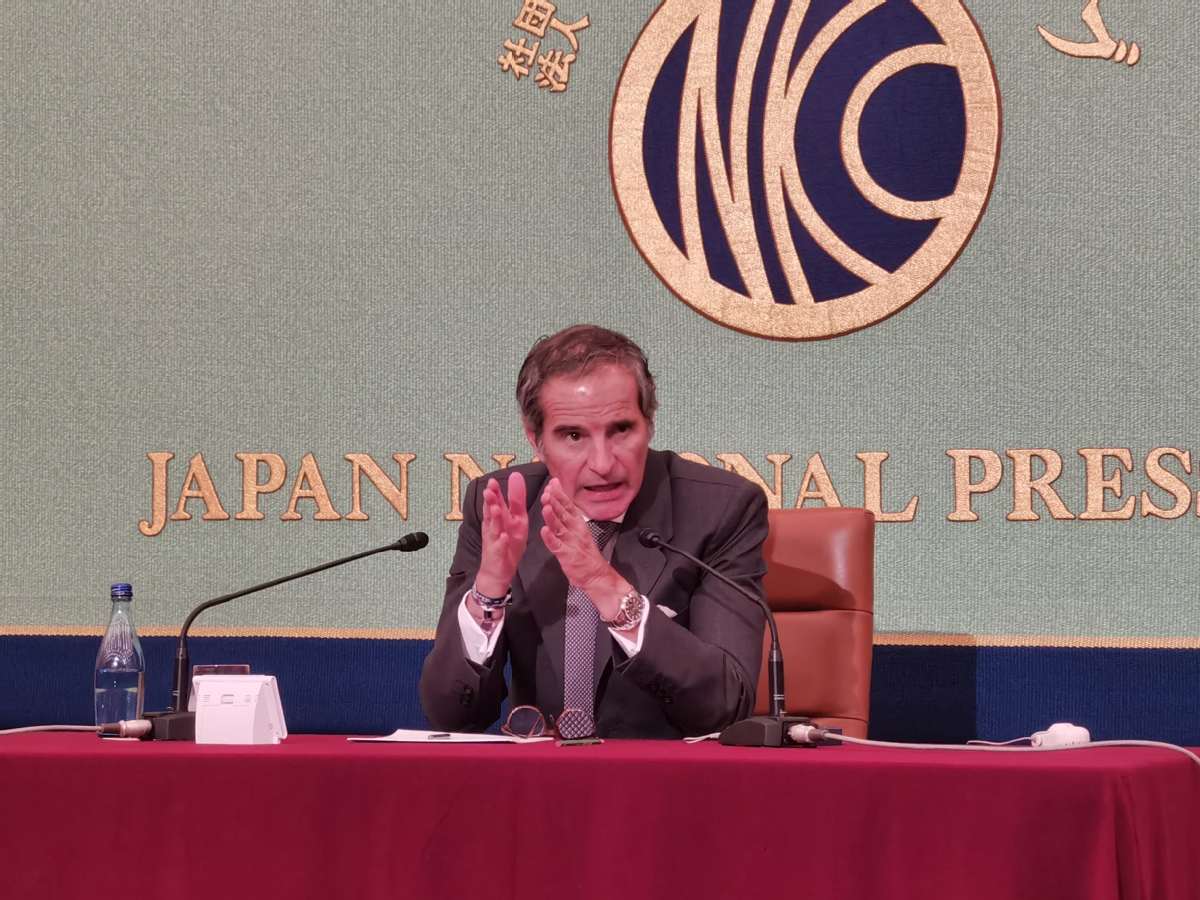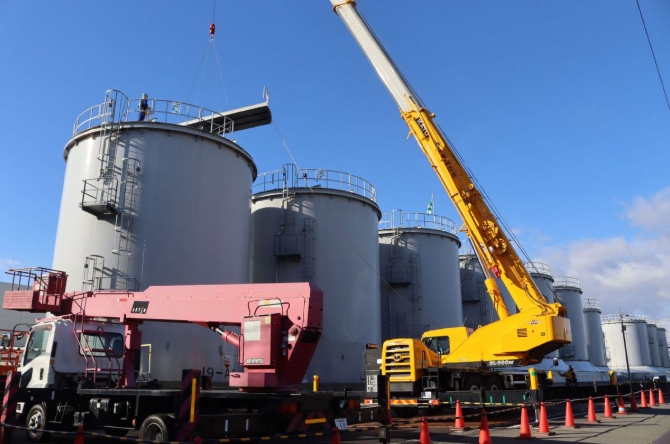
IAEA Director-General Rafael Grossi speaks at a news conference at the Japanese National Press Club in Tokyo on Thursday. He concluded a three-day visit to Japan on the same day. [Jiang Xueqing / China Daily]
The head of the International Atomic Energy Agency wrapped up a three day visit to Japan on Thursday, during which he inspected the stricken Fukushima Daiichi Nuclear Power Plant, even as ordinary Japanese citizens continued to voice their protests against the release of nuclear-contaminated water from the plant into the ocean.
Members of Japanese civic groups have urged the Tokyo Electric Power Company, or TEPCO, the operator of the crippled Fukushima nuclear plant, to be fully transparent in disclosing information about the discharge. They also called on the Japanese government to evaluate the long-term impact of the discharge and emphasized the importance of global cooperation in data collection, pushing for the involvement of third-party organizations and international scientists in monitoring the process.

This handout photo taken and released on February 14, 2025 from Tokyo Electric Power Company (TEPCO) shows the removal of the top lid from J9 area tank at TEPCO Fukushima Daiichi Nuclear Power Plant in Okuma, Fukushima prefecture. The operator of Japan's Fukushima nuclear power plant said it started dismantling hundreds of water tanks on February 14, as it takes apart the site of one of the world's worst meltdowns. [Photo/Agencies]
During his visit, IAEA Director-General Rafael Grossi inspected an interim storage site in Fukushima Prefecture, where soil contaminated by the 2011 Fukushima nuclear disaster is being held. Around 13 million cubic metres of soil — enough to fill 10 stadiums — was scraped from the region to remove harmful radiation. Around 300,000 cubic metres of ash from incinerated organic material is also being stored.
Experts from the IAEA and countries including China and South Korea also collected seawater and fish samples from Fukushima on Wednesday.
Speaking at a news conference at the Japanese National Press Club in Tokyo on Thursday, Grossi expressed appreciation for the participation of Chinese experts in monitoring the ocean discharge.
"I'm very satisfied and also grateful for the Chinese understanding and the participation of their experts," said Grossi. "I hope that we continue in this collaborative way," he added.
China's Foreign Ministry spokesman Guo Jiakun said on Thursday that China sent its experts during Grossi's visit.
"This is part of the steps that Japan has promised to take on the issue of the discharge of the Fukushima nuclear-contaminated water into the sea," Guo said.
"Going forward, we will keep you updated on the progress of the ongoing international monitoring of the nuclear-contaminated water and China's independent sampling and monitoring," he added.
Grossi acknowledged that China and other nations have continued to express concern over the monitoring system for the ocean discharge and have shown desire to play a more active role. In response, and in consultation with Japan, he proposed expanding opportunities within the IAEA's established framework. This would allow experts from China and other interested countries — particularly those which hosts laboratories that regularly collaborate with the IAEA — to participate, collect their own samples, send them to their home countries, and conduct independent evaluations.
Despite these efforts, skepticism remains regarding the reliability of the monitoring process and the transparency of information disclosed within the IAEA's system.
Takae Miyaguchi, a Tokyo resident in her 70s, called on TEPCO to ensure full transparency in disclosing information. She also urged the Japanese government to thoroughly assess the long-term impacts of the release.
"Various stakeholders and independent institutions should be involved in monitoring the discharge of contaminated water," she said.
Ukeru Magosaki, director of the East Asian Community Institute, emphasized the importance of gathering comprehensive and objective data on the release of radioactive water. He urged the Japanese government to actively support global collaboration in data collection. He also underscored the necessity of involving independent third parties and international scientists in the process.
Kenichi Oshima, chairperson of the Citizens' Commission on Nuclear Energy, advocated for an independent organization to oversee the monitoring process. He also proposed the creation of a framework that allows local residents in Japan to participate in the oversight.
Ruiko Mutoh, a representative of the Complainants for Criminal Prosecution of the Fukushima Nuclear Disaster, emphasized that the release proceeded despite strong opposition from many citizens. She highlighted that concerns were voiced not only by China and South Korea but also by Pacific island nations and residents on the West Coast of the United States.
She said the released water contains not only tritium but also various radioactive substances from the nuclear accident, expressing doubt that its safety can be fully confirmed at this stage.
jiangxueqing@chinadaily.com.cn